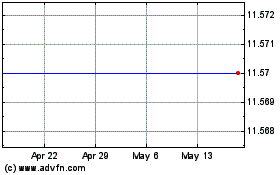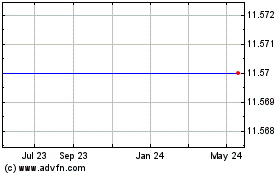BlackBerry Awarded $814.9 Million in Arbitration Against Qualcomm -- 4th Update
April 12 2017 - 5:10PM
Dow Jones News
By Ted Greenwald and Imani Moise
Qualcomm Inc. on Wednesday said it was ordered to refund $814.9
million in patent royalties paid by BlackBerry Ltd., the latest in
a string of setbacks to the chip maker's intellectual-property
licensing business.
The dispute between Qualcomm and BlackBerry -- over a refund of
prepayments based on a disagreement over royalty rates -- is
particular to a licensing agreement between the two companies,
Qualcomm said. It has no impact on Qualcomm's licensing agreements
with other companies, it said.
Still, the issue resonates with the broader question of how much
Qualcomm can continue to profit its intellectual property.
The San Diego-based company has developed technology deemed
essential to cellular communications, and it collects royalties
from nearly every smartphone sold world-wide -- a business that
accounts for most of its profit.
However, that business in recent years has been under attack.
Customers and regulators in several countries have claimed
Qualcomm's licensing regime violates laws governing fair
competition. Apple Inc. in January sued Qualcomm, claiming the
company uses its dominant position in smartphone chips to charge
onerous royalties. The U.S. Federal Trade Commission charged
Qualcomm with anticompetitive practices, and antitrust authorities
in China and South Korea have levied fines against the company.
"There's an overarching question whether customers will continue
to pay them what they've been paying," said Stacy Rasgon of
Bernstein Research. "We've seen evidence that customers are doing
whatever they can in an attempt to pay them less."
Qualcomm said it doesn't agree with the decision, but it can't
be appealed.
The payment will be a big boost for BlackBerry, amounting to
nearly two-thirds of the total revenue BlackBerry generated in
fiscal 2017. A final award including interest and attorney fees
will be issued at a hearing next month, BlackBerry said in a press
release.
The news sparked a rare double-digit spike in BlackBerry's stock
price, which rose more than 16% midday to $8.96 -- the highest
price in more than a year.
Despite the dispute, the companies called each other valued
partners that would continue to work together.
The award settles binding arbitration between the companies that
has been in progress since at least mid-2016, according to Qualcomm
financial filings.
Qualcomm charges royalties based on a percentage of the average
selling price of a device, but its licensing agreement with
BlackBerry included a cap on that price basis. The refund that
BlackBerry won in arbitration retroactively applies that cap to the
prepayments.
Such caps are a negotiable aspect of Qualcomm's licensing
agreements, a person familiar with the matter said. Qualcomm hasn't
disclosed the dollar amount of any caps it has agreed to.
The company has said its royalty rate can be as much as 5% of
the average price per device, but reported its average royalty rate
as 2.9% in its most recent fiscal year, as implied by its total
royalty revenue and its internal research on the number of devices
shipped and their prices.
Qualcomm's payment to BlackBerry is a refund on royalty fees
BlackBerry prepaid to Qualcomm on future sales of devices between
2010 and 2015, which explicitly weren't refundable, Qualcomm
said.
BlackBerry, a pioneer in smartphones, saw its sales tumble
during that period. In fiscal 2011, it generated $16.4 billion in
revenue on hardware sales, largely from shipping 52.3 million
smartphones. By fiscal 2015, hardware revenue plunged to $1.5
billion as smartphone shipments fell to 4 million.
--Jacquie McNish contributed to this article.
Write to Ted Greenwald at Ted.Greenwald@wsj.com and Imani Moise
at imani.moise@wsj.com
(END) Dow Jones Newswires
April 12, 2017 17:55 ET (21:55 GMT)
Copyright (c) 2017 Dow Jones & Company, Inc.
BlackBerry Ltd. (NASDAQ:BBRY)
Historical Stock Chart
From Nov 2024 to Dec 2024

BlackBerry Ltd. (NASDAQ:BBRY)
Historical Stock Chart
From Dec 2023 to Dec 2024
